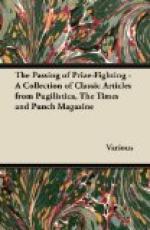* * * * *
QUESTION OF POLITENESS.—Except in the case of a man’s father having been “a big gun” at any time, to call anyone “a Son of a Gun,” has hitherto been considered a gross insult. Is it equally insulting to speak of a Lady as “a Daughter of a Canon?”
* * * * *
AN EMPTY TRIUMPH.
(A Story of Show Sunday.)
It was Show Sunday; lovers of Art were streaming in and out of every Studio they could hunt up, fired with a laudable ambition to break the record by the number they visited in the hours between luncheon and dusk.
[Illustration]
The residence of so rising a painter as TINTORETTO TICKLER was naturally a place in which no person of any self-respect would neglect to be seen; and on this particular afternoon the entrance-hall, sitting-rooms, and studio were simply choked with an eager throng of friends, acquaintances, and utter strangers; for TINTORETTO’S lavish hospitality was well known, and no expense had been spared to give his guests as favourable an impression of his talent as possible. A couple of knights, clad in complete steel—the local greengrocer and an Italian model—took the guests’ hats, and announced their names; there were daffodils and azaleas in profusion; the Red Roumanians performed national airs in the studio-gallery; Italian mandolinists sang and strummed on the staircase, and, in the dining-room, trim maid-servants, in becoming white caps and streamers, dispensed coffee, claret-cup, and ices to a swarm of well-conducted social locusts.
Just outside his painting-room stood TINTORETTO TICKLER, at the receipt of compliment, which was abundantly and cheerfully paid. Indeed, the torrent of congratulation and delicately-expressed eulogy was almost overwhelming. One lovely and enthusiastic person told him that the sight of his “Dryad Disturbing a Beanfeast” had just marked an epoch in her mental development, and that she considered it quite the supreme achievement of the Art of the Century. A ponderous man in spectacles, whom TICKLER had no recollection of having ever met before in his life, encouraged him by his solemn assurance that his “Jews Sitting in a Dentist’s Waiting-room, in the reign of King John,” was perfectly marvellous in its realism and historical accuracy, and that it ought to become the property of the Nation; while an elderly lady, in furs and a crimped front, declared that the pathos of his nursery subject—a child endeavouring to induce a mechanical rabbit to share its bread-and-milk—was sending her home with tears in her eyes. Some talked learnedly of his “values,” his “atmosphere,” and the subtlety of his modelling; all agreed that he had surpassed himself and every living artist by his last year’s work, and no one made any mistake about the nature of his subjects, perhaps because—in consideration for the necessities of the British Art-patron—they had been fully announced and described in the artistic notes of several Sunday papers.




